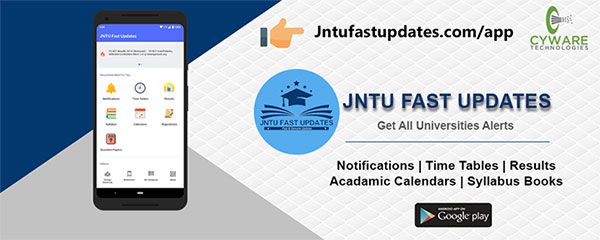JNTUK R20 1-1 Applied Chemistry Material PDF Download
Students those who are studying JNTUK R20 ECE Branch, Can Download Unit wise R20 1-1 Applied Chemistry Material/Notes PDFs below.

JNTUK R20 1-1 Applied Chemistry Material PDF Download
OBJECTIVES:
- Importance of usage of plastics in household appliances and composites (FRP) in aerospace and automotive industries.
- Outline the basics for the construction of electrochemical cells, batteries and fuel cells. Understand the mechanism of corrosion and how it can be prevented.
- Explain the preparation of semiconductors and nanomaterials, engineering applications of nanomaterials, superconductors and liquid crystals.
- Recall the increase in demand for power and hence alternative sources of power are studied due to depleting sources of fossil fuels. Advanced instrumental techniques are introduced.
- Outline the basics of computational chemistry and molecular switches
NOTE:
- Reference-3 Material Added.
UNIT-1
POLYMER TECHNOLOGY
Polymerisation:- Introduction, methods of polymerization (emulsion and suspension), mechanical properties. Plastics: Compounding, fabrication (compression, injection, blown film and extrusion), preparation, properties and applications (PVC, polycarbonates and Bakelite), mention some examples of plastic materials used in electronic gadgets, recycling of e-plastic waste (waste to wealth).
Elastomers:- Introduction, preparation, properties and applications (Buna S, thiokol and polyurethanes).
Composite materials: Fiber reinforced plastics, conducting polymers, biodegradable polymers, biopolymers, biomedical polymers.
Course Outcomes: At the end of this unit, the students will be able to Analyze the different types of composite plastic materials and interpret the mechanism of conduction in conducting polymers.
Download UNIT-1 Material PDF | Reference-2 | Ref-3
UNIT-2
ELECTROCHEMICAL CELLS AND CORROSION
Single electrode potential, electrochemical series and uses of series, standard hydrogen electrode, calomel electrode, construction of glass electrode, batteries (Dry cell, Li ion battery and zinc air cells), fuel cells (H2-O2, CH3OH-O2, phosphoric acid and molten carbonate).
Corrosion:-Definition, theories of corrosion (chemical and electrochemical), galvanic corrosion, differential aeration corrosion, stress corrosion, galvanic series, factors influencing rate of corrosion, corrosion control (proper designing and cathodic protection), Protective coatings (surface preparation, cathodic coatings, anodic coatings, electroplating and electroless plating [nickel]), Paints (constituents, functions and special paints).
Course Outcomes: At the end of this unit, the students will be able to Utilize the theory of construction of electrodes, batteries and fuel cells in redesigning new engineering products and categorize the reasons for corrosion and study methods to control corrosion.
Download UNIT-2 Material PDF | Reference-2 | Ref-3
UNIT-3:
MATERIAL CHEMISTRY
Part I : Non-elemental semiconducting materials:-
Stoichiometric, controlled valency & chalcogen photo/semiconductors-preparation of semiconductors (distillation, zone refining, Czochralski crystal pulling, epitaxy, diffusion, ion implantation) – Semiconductor devices (p-n junction diode as rectifier, junction transistor).
Insulators & magnetic materials: electrical insulators-ferro and ferri magnetism-Hall effect and its applications.
Part II: Nano materials:-
Introduction, sol-gel method, characterization by (Brunauer Emmet Teller [BET]), (scanning electron microscopy [SEM]) and (transmission electron microscopy [TEM]), applications of graphene and fullerenes, carbon nanotubes (types, preparation and applications)
Liquid crystals:– Introduction-types-applications.
Super conductors:-Type –I, Type II-characteristics and applications
Course Outcomes: At the end of this unit, the students will be able to Synthesize nanomaterials for modern advances of engineering technology.
Summarize the preparation of semiconductors; analyze the applications of liquid crystals and superconductors.
Download UNIT-3 Material PDF | Reference-2 | Ref-3
UNIT-4:
SPECTROSCOPIC TECHNIQUES & NON-CONVENTIONAL ENERGY SOURCES
Part A: SPECTROSCOPIC TECHNIQUES
Electromagnetic spectrum-UV (laws of absorption, instrumentation, theory of electronic spectroscopy, Frank-condon principle, chromophores and auxochromes, intensity shifts, applications), FT-IR [instrumentation and differentiation of sp, sp2 , sp3 and IR stretching of functional groups (alcohols, carbonyls, amines) applications], magnetic resonance imaging and CT scan (procedure & applications).
Part B: NON-CONVENTIONAL ENERGY SOURCES
Design, working, schematic diagram, advantages and disadvantages of photovoltaic cell, hydropower, geothermal power, tidal and wave power, ocean thermal energy conversion.
Course Outcomes: At the end of this unit, the students will be able to Analyze the principles of different analytical instruments and their applications. Design models for energy by different natural sources
Download UNIT-4 Material PDF | Reference-2
UNIT-5:
ADVANCED CONCEPTS/TOPICS IN CHEMISTRY
Computational chemistry: Introduction to computational chemistry, molecular modelling and docking studies
Molecular switches: characteristics of molecular motors and machines, Rotaxanes and Catenanes as artificial molecular machines, prototypes – linear motions in rotaxanes, an acid-base controlled molecular shuttle, a molecular elevator, an autonomous light-powered molecular motor
Course Outcomes: At the end of this unit, the students will be able to Obtain the knowledge of computational chemistry and molecular machines
Download UNIT-5 Material PDF | Reference-2
TEXT BOOKS:
- Standard Books: 1. P.C. Jain and M. Jain “Engineering Chemistry”, 15/e, Dhanpat Rai & Sons, Delhi, (Latest edition).
- Shikha Agarwal, “Engineering Chemistry”, Cambridge University Press, New Delhi, (2019).
- S.S. Dara, “A Textbook of Engineering Chemistry”, S.Chand & Co, (2010).
- Shashi Chawla, “Engineering Chemistry”, Dhanpat Rai Publicating Co. (Latest edition).
REFERENCE BOOKS:
- K. Sesha Maheshwaramma and Mridula Chugh, “Engineering Chemistry”, Pearson India Edn.
- O.G. Palana, “Engineering Chemistry”, Tata McGraw Hill Education Private Limited, (2009).
- CNR Rao and JM Honig (Eds) “Preparation and characterization of materials” Academic press, New York (latest edition)
- B. S. Murthy, P. Shankar and others, “Textbook of Nanoscience and Nanotechnology”, University press (latest edition)

320-x100(1).gif)

Is there any reduction syllabus in the uploaded materials?
Is there any reduction syllabus in the uploaded materials? 1-1sem
In Unit-5 material, I couldn't find material regarding molecular switches
Did u get unit5 material
Sir please provide Unit:-5 "Advanced concepts /topics in chemistry", material.
we will update asap.
When will u update sir🙄?